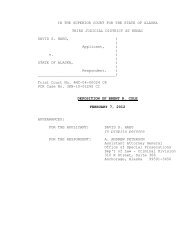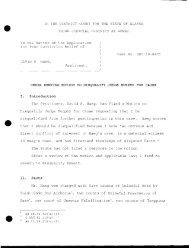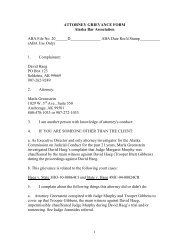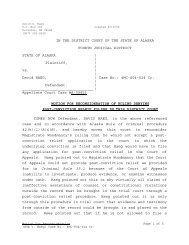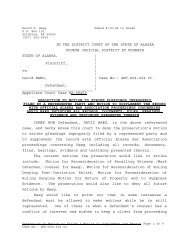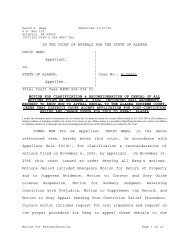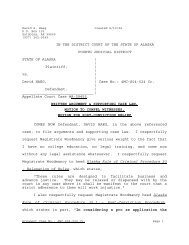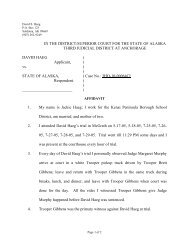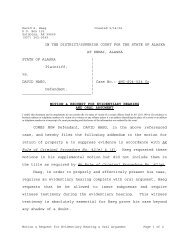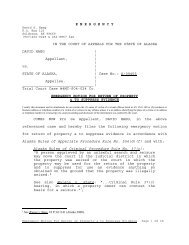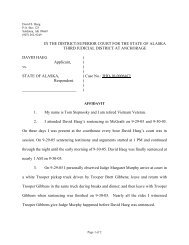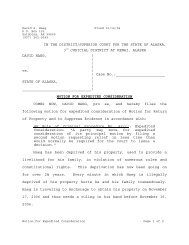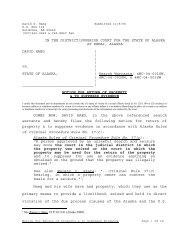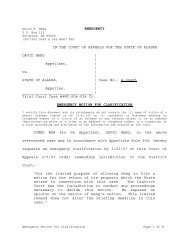PCR Exhibits - Alaska State of Corruption
PCR Exhibits - Alaska State of Corruption
PCR Exhibits - Alaska State of Corruption
You also want an ePaper? Increase the reach of your titles
YUMPU automatically turns print PDFs into web optimized ePapers that Google loves.
conviction <strong>of</strong> a pro se defendant. McIntire v. <strong>State</strong>, 42 P.3d 558, 562-63 (<strong>Alaska</strong> App. 2002)<br />
(reversing conviction for inadequate inquiry). 1<br />
These advisements are critical to establishing a valid waiver. They must include an<br />
explanation <strong>of</strong> the function <strong>of</strong> defense counsel, e.g., conduct voir dire to ensure selection <strong>of</strong><br />
impartial jury, cross-examine state witnesses, object to inadmissible-evidence, call and examine<br />
defense witnesses, and argue the case to the jury. And they must also include an explanation <strong>of</strong><br />
the dangers <strong>of</strong> self-representation; it is not sufficient for the trial court to simply advise a<br />
defendant that it would be foolhardy to proceed without counsel. The purpose <strong>of</strong> this inquiry is<br />
"so that the record will establish that '[the defendant] knows what he is doing and his choice is<br />
made with eyes open."' James, 730 p.2d at 814 n.l (quoting, I ABA Standards for Criminal<br />
Justice § 3-3.6 commentary at 6.39-40 (2nd ed. 1982)), modified on reh'g, 739 P.2d 13 14<br />
(<strong>Alaska</strong> App. the criminal justice system, although a factor is not an adequate substitute for these<br />
explanations. McIntire, 42 P.3d at 562 (pro se defendant had been previously been convicted <strong>of</strong><br />
seven misdemeanors and a felony, had viewed the court system video many times; and was<br />
assisted by two paralegals at trial; his experience with criminal justice system did not cure<br />
judge's inadequate inquiry).<br />
The proper standard <strong>of</strong> review <strong>of</strong> a trial court's findings regarding waiver <strong>of</strong> a<br />
constitutional right is whether the trial court's finding <strong>of</strong> waiver is supported by substantial<br />
evidence. Walunga v. <strong>State</strong>, 630 P d 527, 528 (<strong>Alaska</strong> 1980). Whether a defendant has<br />
knowingly, intelligently, and voluntarily waived his right to counsel is a question <strong>of</strong> fact to be<br />
determined in light <strong>of</strong> the totality <strong>of</strong> the circumstances. James v. <strong>State</strong>, 730 P.2d 811, 817<br />
(<strong>Alaska</strong> App. 1987), (Singleton, dissenting), modified on reh’g, 739 P.2d 1314 (<strong>Alaska</strong> App.<br />
1987) (citing Maynard v. Meachum, 545 F.2d 273,277-79 (1st Cir. 1976)). The <strong>Alaska</strong> Supreme<br />
Court requires that the trial court first establish that the defendant can represent himself in a<br />
"rational and coherent manner" and then determine whether "the prisoner understands precisely<br />
what he is giving up by declining the assistance <strong>of</strong> counsel" before allowing the defendant to<br />
appear pro se. Evans, 822 P.2d at 1373 (citing McCracken, 5 18 P.2d at 9 1). The trial judge<br />
must explain the advantages <strong>of</strong> legal representation in "some detail." Evans, 822 P.2d at 1373<br />
(citing McCracken, 51 8 P.2d at 92). The record must reflect a clear waiver <strong>of</strong> the right to<br />
1 In Gladden v. <strong>State</strong>, 110 P.3d 1006, 1009-11 (<strong>Alaska</strong> App. 2005). Gladden was charged with the<br />
fairly uncomplicated charge <strong>of</strong> driving on a suspended license. He watched the court system video<br />
which "explained the benefits <strong>of</strong> counsel in general terms" and the trial judge actually gave him<br />
copies <strong>of</strong> United <strong>State</strong>s Supreme Court opinions, including the landmark opinion <strong>of</strong> Johnson v.<br />
Zerbst, 304 U.S. 458, 58 S.Ct. 1019, 82 L.Ed. 1461 (1938) ("the obvious truth that the average<br />
defendant does not have the pr<strong>of</strong>essional legal skill to protect himself when [ ] the prosecution is<br />
presented by experienced and learned counsel.") The court <strong>of</strong> appeals concluded that, "[tlhe record<br />
suggests that Gladden understood the value <strong>of</strong> an attorney, at least in general terms." 110 P.3d at<br />
1010. In fact, Gladden insisted on representing himself-arguing that <strong>Alaska</strong>-licensed "attorneys"<br />
were not the same as "counsel" guaranteed to him by the Sixth Amendment. This argument itself<br />
certainly suggested that Gladden had a grasp <strong>of</strong> the significance <strong>of</strong> the right he was waiving. The<br />
case was not complex, and the prosecution's entire case consisted <strong>of</strong> a certified copy <strong>of</strong> his DMV<br />
record and the testimony <strong>of</strong> the <strong>of</strong>ficer who saw him driving. Yet, the court <strong>of</strong> appeals reversed,<br />
holding that the trial court's inquiry was inadequate, and too general. Gladden, 110 P.3d at 1010.<br />
260



